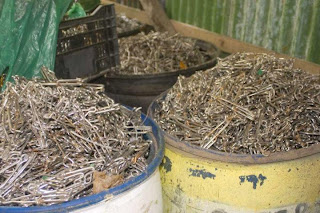Yesterday was more of the same – hooks, gastillas, and rain.
Sitting under the corrugated roof of the open-air shop down by the river with Guillermo Hernandez, another volunteer. He’s teaching me the words to “El Dia Que Me Quieras”. El dia que me quieras, la rosa que engalana.Water streams off the eaves, drips down onto the cement slab through a hole in the roof, but where we sit is dry. Untangle a hook from the snare in the barrel. Lay hook and line across the saw horse. Tap, thwack, thwack, with the hammer and chisel. Little line scrap goes in the yellow bucket, hooks go in the red. Next hook and line.
I was averaging between three and five hooks a minute. 60 minutes in an hour, so that’s 180 to 300 hooks in an hour. We worked for a solid seven hours. That’s 1260-2100 hooks over the course of the day, for me alone. With two of us working steadily, we probably processed between 2500 and 4200 hooks over the course of yesterday.
The last patrol I went out on, we collected 44 hooks off of one line. So take the lower number of hooks processed in a day (let’s be modest) – 2500 – and divide that by 44 – you get approximately 56. What does that mean? Over the course of yesterday, we processed hooks from at least 56 confiscated lines. Probably more. We’ve worked for two days on this one barrel, and we’re about one-third of the way through. We probably have at least a week of work left, maybe more, on the backlog of hooks and tangled line. Let’s say seven days of steady work. That means that we’re looking at 504 confiscated lines sitting here on the island – at the very least! And these are only the lines that the Cocos Island patrol pulls out of the water. I know for a fact that the UnderSea Hunter Group boats pull lines out of the water regularly too.
The numbers that I’ve just thrown out are the lower end of the scale, but impressive nonetheless. But I have a hunch that those numbers are far more staggering, and the reality is that the situation is far more desperate than we think.





